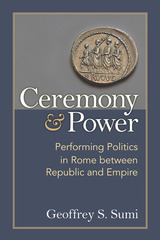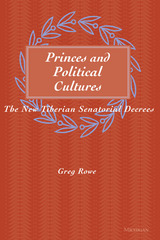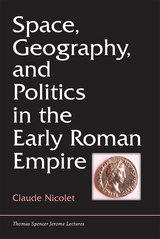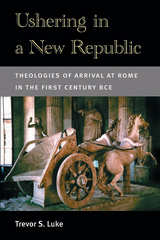4 books about 30 B.C.-68 A.D

Ceremony and Power
Performing Politics in Rome between Republic and Empire
Geoffrey S. Sumi
University of Michigan Press, 2015
In Ceremony and Power, Geoffrey Sumi is concerned with the relationship between political power and public ceremonial in the Roman Republic, with particular focus on the critical months following Caesar's assassination and later as Augustus became the first emperor of Rome. The book traces the use of a variety of public ceremonies, including assemblies of the people, triumphs, funerals, and games, as a means for politicians in this period of instability and transition to shape their public images and consolidate their power and prestige. Ultimately, Sumi shows that the will of the people, whether they were the electorate assembled at the comitia, the citizen body at the contio, the spectators at the theater, the crowd at the triumph, or mourners at a funeral, strongly influenced the decisions and actions of Roman aristocrats.
[more]

Princes and Political Cultures
The New Tiberian Senatorial Decrees
Greg Rowe
University of Michigan Press, 2002
An investigation of the transformation of the Roman state from Republic to dynastic monarchy
[more]

Space, Geography, and Politics in the Early Roman Empire
Claude Nicolet
University of Michigan Press, 2015
Drawing on unexpected texts both ancient and modern, Space, Geography, and Politics in the Early Roman Empire offers startling insights into the character of Rome and its princeps-turned-emperor, Augustus. Claude Nicolet documents Roman expansion at the start of the early imperial period and explores how Romans came to map the world they knew and conquered. The roles of both the agrimensores, who worked in the state’s interest observing and recording new territories, and M. Vipsanius Agrippa, the sometime son-in-law of Emperor Augustus, are considered. Nicolet also presents the integral relations between territorial expansion and political expansion, as well as between propaganda cultivated in the national interest and propaganda designed to secure the status of the princeps as primus inter pares, first among equals.
[more]

Ushering in a New Republic
Theologies of Arrival at Rome in the First Century BCE
Trevor S. Luke
University of Michigan Press, 2014
The ancient Romans are well known for their love of the pageantry of power. No single ceremony better attests to this characteristic than the triumph, which celebrated the victory of a Roman commander through a grand ceremonial entrance into the city that ended in rites performed to Rome’s chief tutelary deity, Jupiter Optimus Maximus, on the Capitoline hill. The triumph, however, was only one form of ceremonial arrival at the city, and Jupiter was not the only god to whom vows were made and subsequently fulfilled at the end of a successful assignment. Ushering in a New Republic expands our view beyond a narrow focus on the triumph to look at the creative ways in which the great figures of Rome in the first century BCE (men such as Sulla, Caesar, Augustus, and others) crafted theological performances and narratives both in and around their departures from Rome and then returned to cast themselves in the role of divinely supported saviors of a faltering Republic.
Trevor S. Luke tackles some of the major issues of the history of the Late Republic and the transition to the empire in a novel way. Taking the perspective that Roman elites, even at this late date, took their own religion seriously as a way to communicate meaning to their fellow Romans, the volume reinterprets some of the most famous events of that period in order to highlight what Sulla, Caesar, and figures of similar stature did to make a religious argument or defense for their actions. This exploration will be of interest to scholars of religion, political science, sociology, classics, and ancient history and to the general history enthusiast. While many people are aware of the important battles and major thinkers of this period of Roman history, the story of its theological discourse and competition is unfolded here for the first time.
[more]
READERS
Browse our collection.
PUBLISHERS
See BiblioVault's publisher services.
STUDENT SERVICES
Files for college accessibility offices.
UChicago Accessibility Resources
home | accessibility | search | about | contact us
BiblioVault ® 2001 - 2024
The University of Chicago Press









